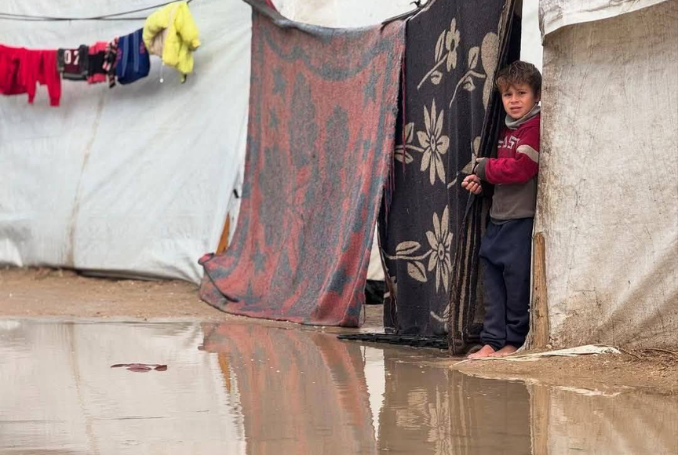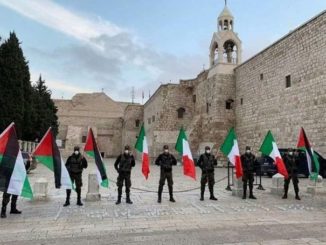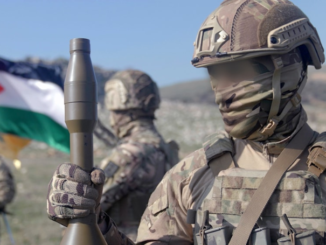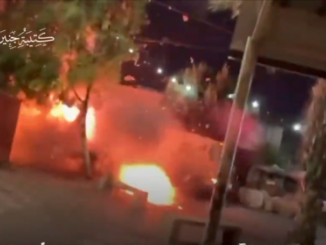
Heavy rains and freezing temperatures in Gaza have left displaced Palestinians, including infants, vulnerable to death and suffering.
Gaza’s Civil Defense Authority has reported receiving hundreds of distress calls from displaced Palestinians whose tents and shelters have been flooded by the heavy rainfall, pleading for help to save their children.
“Our crews can only evacuate citizens from their damaged shelters to other places that are mostly unfit for shelter, and they remain outdoors in the rain and the extreme cold,” the Civil Defense said in a statement on Tuesday.
Difficult scene for a displaced family from one of Gaza displacement centers taking shelter in a flimsy tent as the rain continues to heavily fall these days. pic.twitter.com/BCrFvOCm7S
— Quds News Network (@QudsNen) December 30, 2024
The authority called on “people of conscience to come forward to save these families, and to help them move to suitable shelters that protect them from rainwater, especially those displaced in the camps in downtown Gaza City, Mawasi, Khan Yunis, Rafah, and western Deir al-Balah.”
Infants Freeze to Death
Seven Palestinians, including six infants, have died due to the freezing temperatures with the Government Media Office warning that more deaths could be expected as the weather conditions worsen.
“We have repeatedly warned about the dangers of the approaching weather depressions, the winter season, and cold waves coinciding with the catastrophic reality our people are enduring,” the Media Office said in a statement on Monday.
Six Children Freeze to Death in Gaza – Rainfall Worsens Conditions for Displaced
It said heavy rainfall was expected to continue, “creating a great danger that constitutes a real threat to the lives of the displaced who are suffering as a result of the Israeli occupation’s crimes against them.”
This, the statement continued, includes the demolition of their homes and residential neighborhoods, forcing them to flee “to worn-out tents that do not protect them from the cold of winter or the harsh waves of frost.”
Ongoing Genocide
The ongoing Israeli assault on the Gaza Strip, which began on October 7, 2023, has led to a humanitarian crisis of unprecedented scale. As the death toll among besieged and starved Palestinian civilians continues to rise daily, Israel is currently facing charges of genocide against Palestinians before the International Court of Justice (ICJ).
'Welcome to Hell' – Rights Groups Confront Israel's Genocide
If you take the two latest reports by the International rights groups, Amnesty International and Human Rights Watch, and pair them with Israel's own human rights group B'tselem's reports, you will get a picture of the… pic.twitter.com/DAQinpqirC
— The Palestine Chronicle (@PalestineChron) December 29, 2024
According to Gaza’s Ministry of Health, at least 45,541 Palestinians have been killed, and 108,338 wounded in Israel’s ongoing genocide in Gaza starting on October 7, 2023. The toll is expected to rise further, with at least 11,000 people still unaccounted for, presumed dead under the rubble of their homes across Gaza.
The war, which Palestinians call “Operation Al-Aqsa Flood,” began after a military operation carried out by Hamas on Israeli territory. Israel reports that 1,200 of its soldiers and civilians were killed during the initial attack on October 7. However, Israeli media have raised concerns that a significant number of Israeli casualties were caused by ‘friendly fire’ during the assault.
Humanitarian Disaster
Human rights organizations, both Palestinian and international, have reported that the overwhelming majority of the casualties in Gaza are women and children. The ongoing violence has also exacerbated an acute famine, with thousands of children among the dead, highlighting the severity of the humanitarian disaster.
The war has displaced nearly two million people from their homes across Gaza, with the majority of the displaced forced into the already overcrowded southern region of the Strip. The population in Gaza remains trapped in the ongoing conflict, with little access to basic necessities such as food, water, and medical care.
(PC, Al Mayadeen)










Be the first to comment